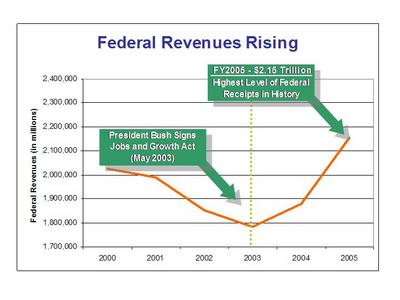Hiding the good news

According to estimates from the Office of Management and Budget, tax revenues are expected to produce the greatest amount of revenue in history. The projected budget deficit will be revised downward by 100 billion dollars. This good economic news I found on the AP wire yesterday with the headline Surprising Jump in Tax Revenues Curbs U.S. Deficit. But I had a difficult time finding any mention of this news today. Even though most liberals and progressives, like the editors and publishers of the NY Times, accuse the Bush administration of advancing economic policy that favors big business and gives tax cuts to the wealthy, the article says that the increase in tax revenue is due to phenomenal increases in tax funds from corporations and the wealthy.
A good analysis of this article can be found in this article, "Eeyore Covers the Budget." Eeyore, of course, is the gloomy donkey friend of Winnie the Pooh. There is never reason for optimism and hope with him. That's why the NY Times and other liberal outlets of the mainstream media must hide good economic news that vindicates and validates President Bush's policy of tax cuts, and why even good news must be spun with "Yeah, but" clauses. It is clear that this is meant to influence the American electorate to believe that the economy is a disaster from which only the Democrats can be counted on to save the country. Good news is withheld or corrupted for the sake of political power.
I can't help making a comparison to the time of the Reformation. The good news was withheld from lay people. The good news of the Gospel, had it "gotten out" without corruption or spin, would have let them know that they didn't need to do penance or buy indulgences or make pilgrimage or rely on the sacramental system of the Church in order to maybe get into heaven after a purgatorial stay. After the good news got out via Luther and the other reformers, the Church continued to try to maintain its grip on power, both militarily and politically. Religious wars were the norm in Europe until 1648, when the Peace of Westphalia ended the Thirty-Years' War on terms that strongly favored the powerful monarchy of France.
For some, the good news was the proclamation of Freedom--from bondage to sin and to the demands of God's law. It was, and is, good news to trust that our sins are forgiven in Christ, and that we need not fear God's punishment because Jesus has died on the cross and paid the price demanded for our sin. But for others, the "good news" was merely seen as liberation from authority and autocracy of every kind. Freedom from an oppressive church meant freedom from God altogether. These were the sons of the "Enlightenment," a truly ironic label for those who chose to leave one dark cave and enter another.
There are always going to be some who distort good news to suit their own ends. There will always be those who choose not to believe good news. Does that make those who bring the good news "dividers, not uniters?" I suggest you also take a look at this piece from the LA Times, in which the mainline denominations of Christianity are analyzed. Those who hold to truth and proclaim good news will always be seen as "dividers" by those whose political power depends on the repression of good news.
Use the comments section to relate your observations of the phenomenon of "spinning" good news away, either in a political sense or in a religious one.


<< Home